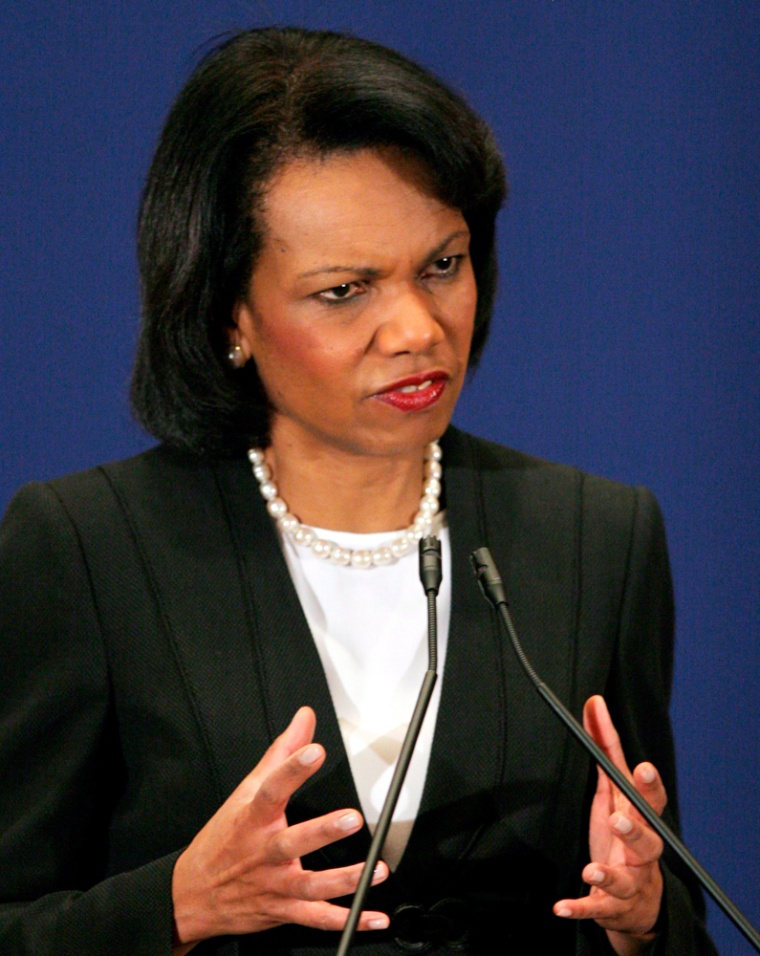Israeli and Palestinian leaders have agreed to meet every two weeks to discuss day-to-day issues, a small step in a quickening diplomatic pace that could lead to talks on a final peace settlement, Secretary of State Condoleezza Rice announced Tuesday.
After shuttling between the two sides for the past three days, Rice also said that an American general serving as her security envoy will try to set benchmarks for a cease-fire, including halting rocket fire from Gaza and improving the flow of Palestinian travelers and goods through Israeli crossings.
“The Israelis and the Palestinians are taking the initial step on the path to peace,” Rice said. “The American role will include helping them to overcome obstacles, develop new ideas and rally international support for their efforts.”
Rice said the first talks between the two leaders will be on practical questions, not the so-called “final status” issues defining peace and security between Israel and an independent Palestine. But she did not rule out formal negotiations on those hard questions before President Bush leaves office in less than two years.
The most difficult issues dividing Israel and the Palestinians include the borders of an eventual Palestinian state, the fate of disputed Jerusalem and the rights of Palestinians and their descendants who left land when Israel was formed in 1948.
Praise for Olmert, Abbas
Rice praised Israeli Prime Minister Ehud Olmert and Palestinian President Mahmoud Abbas for flexibility and resolve, although both leaders have balked at making overtures suggested by the United States.
“They achieved something, which is the very regularized meetings between the two of them, in which they will not just talk about their day-to-day issues, but also about a political horizon,” Rice said, speaking at a news conference in Jerusalem.
Rice called on Arab states to hold contacts with Israel, and said peacemaking was made “more complex” by Hamas’ presence in the government. Israel, the United States and the European Union count Hamas as a terror group.
She arrived in the region Sunday for her fourth visit in four months, in an attempt to push the Israeli and Palestinian leaders closer to resuming peace talks.
‘Path to cooperation’
The new Palestinian government, a coalition between the Islamist Hamas group and the more moderate Fatah, was inaugurated last week. Rice said a “path to cooperation” with the new government exists, but that it must first renounce terrorism.
Abbas has called the deal the best he could get from the politically formidable militants, and a necessary step to end deadly internal Palestinian violence.
Olmert, who once had called Abbas a “partner for peace,” said the deal meant he would limit talks with the Palestinian leader to humanitarian or similar immediate concerns. He initially ruled out more detailed discussions or negotiations.
Olmert’s reconsideration of that stance was a small step, since Olmert held such sessions with Abbas before the Hamas deal, but a sign of fresh and surprising traction toward peace talks despite the complication posed by Hamas.
‘Confidence-building’ sessions
A senior U.S. official, speaking to The Associated Press on condition of anonymity ahead of Tuesday’s address, said Olmert and Abbas initially would hold low-key “confidence-building” sessions. The talks have “an open door to all issues,” the official said, but it was clear that the United States wanted Israel to go farther.
Negotiators haggled behind closed doors for several hours Monday night, apparently stuck over whether Olmert would fully open the door to fresh talks over the hardest issues that divide Israel and the Palestinians, such as the borders of an eventual Palestinian state and the fate of disputed Jerusalem.
It was not clear when the leaders might meet, although Palestinian officials had said U.S. diplomats proposed a date in mid-April.
Rice has shuttled between Israeli, Palestinian and Arab leaders this week, trying to rally greater Arab support for eventual peace negotiations, and to persuade Israel to be more flexible in its dealings with Abbas.
Rice held two sessions apiece with Abbas and Olmert, including a lengthy evening meeting with Olmert in her Jerusalem hotel on Monday. The agreement for new meetings with Abbas apparently came then.
On Monday, Olmert said he “wouldn’t hesitate” to take part in a regional summit. Palestinian officials cautiously endorsed the idea.
Huge breakthrough imminent?
Any such meeting — especially if Saudi and Israeli officials were to publicly meet — would be a huge symbolic breakthrough. Saudis and Israelis are believed to have held private meetings in the last year.
Rice said Monday it is “premature to talk about any specific kind of meeting,” but another U.S. official said the idea of a large group meeting is one proposal among several under discussion. Nothing has been scheduled.
Rice’s visit was timed before a critical Arab League summit later this week in Saudi Arabia.
Rice wants Arab states to reissue a broad 2002 land-for-peace offer to Israel, and be willing to negotiate with the Jewish state. Some version of the plan is expected to be part of the upcoming summit in Riyadh.
